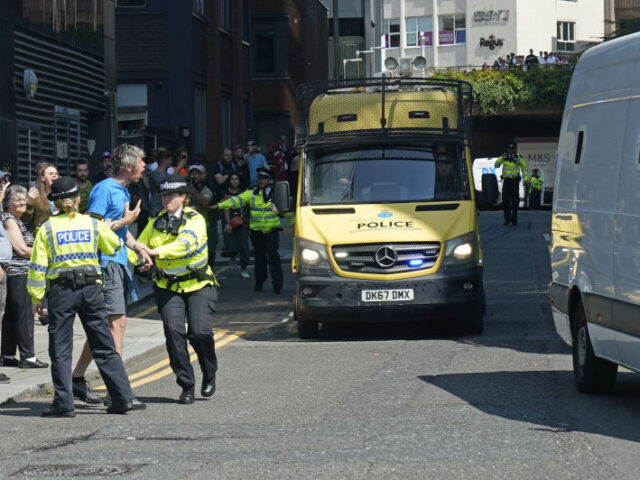The UK Prime Minister has vowed to come down on what he called “a tiny mindless minority in our society” of people rioting against the mass stabbing of children as a judge names attack suspect Alex Rudakubana, citing the dangers of an information “vacuum” being allowed to form.
A British judge lifted reporting restrictions on the identity of the suspect charged with three counts of murder, ten of attempted murder, and one of posessing a knife on Thursday afternoon. Rwandan-heritage Alex Rudakubana of Merseyside was named , with the judge acknowledging doing so was “exceptional” because he is under the age of 18 and consequently ought normally to be tried anonymously, but saying the fact the defendant’s 18th birthday is in six days ameliorates the decision.
There have been several nights of protests turned to riots in some cases in towns across England following Monday’s attack and many have stated this situation has been fed by a major lack of information from the authorities about the attack. The judge acknowledged this too in his remarks accompanying lifting the anonymity of the suspect, stating: “Continuing to prevent the full reporting has the disadvantage of allowing others to spread misinformation, in a vacuum.”
The court heard that Rudakubana allegedly entered a dance party for young children in Southport, Merseyside, and stabbed 13 people inside with a “curved kitchen knife”. Rudakubana arrived at court this morning in a motorcade of police vehicles including riot vans, and large numbers of police officers stood outside the court to dissuade trouble.
Nevertheless, a large group gathered and Rudakubana’s police vehicle was cursed by some as it left the building. Newspaper The Daily Telegraph reports “a number of people shouted “f****** scumbag” as the prison van pulled out of the complex” and police stepped in to keep some people away from the vehicles.
Protests took place in Southport, Manchester, Hartlepool, Aldershot, and London. Over 100 arrests occurred nationwide.
In a week where a room full of children were stabbed, and where protests against the attack turned to riots, the government has decided to act against the rioters first, with the Prime Minister declaring “the immediate challenge is driven by far-right hatred” and announcing a new anti-riot police capability.
Speaking at Downing Street this afternoon, Sir Keir Starmer stated there had been no protests in the country, only illegitimate riots caused by “a tiny mindless minority in our society”. While acknowledging briefly there is “understandable fear”, he said he would not allow that emotion to “curdle into division and hate”.
He said: “Let’s be very clear about this, it’s not protest. It’s not legitimate. It’s crime, violent disorder… this is not a protest that has got out of hand, this is a group of individuals who are absolutely bent on violence.”
As for the solution, Sir Kier said: “I can announce today that following this meeting, we will establish a national capability across police forces to tackle national disorder. These thugs are mobile, they move from community to community, so we must have a policing response that can do the same.”
This would involve sharing intelligence between police forces about rioters, he said, as well as “wider deployment of facial recognition technology, and preventative action: criminal behaviour orders to restrict their movement, before they can even board a train”.
Sir Keir did not make any remarks about increasing protection for children in the wake of the mass stabbing on Monday, but did vow to “take every step that’s necessary to keep you safe” after a Mosque had its windows broken during a riot this week.
The Prime Minister also launched a warning at social media companies for allowing discussion about events on their platforms, accusing them of allowing crimes to be committed on their platforms.
The move to name the alleged child killer today follows several figures questioning the wisdom of keeping the public in the dark when there is such significant interest, and evident opportunity for unrest. Last night, Reform UK leader Nigel Farage MP said he had raised questions about the government withholding so much information from the public, noting: “it seems whenever these things happen, there is a reluctance to tell us the full truth… the need to play down the incident”.
The information vacuum, Farage said, has caused the riots and protests. He said: “the internet was awash with all sorts of theories, all of which proved to be unfounded. That’s what led to the riots last night. That’s what led to people being outside that riot in Southport.”
Suggesting a different way, Mr Farage said: “sometimes just tell the public the truth, and you might actually stop riots from happening”.
That Mr Farage has expressed disquiet about the information vacuum situation in recent days has led to major criticism from some left-wing figures in recent days, who have accused him of spreading conspiracy theories by posing questions, or of actively encouraging riots. Among them are former London counter-terrorism police boss Neil Basu, called a “woke” police chief by some, who said Mr Farage had failed to keep his “mouth shut”.
“Has Nigel Farage condemned the violence? Has he condemned the EDL?”, Basu asked, without apparently engaging with the fact Mr Farage has been condemning the EDL for years.


